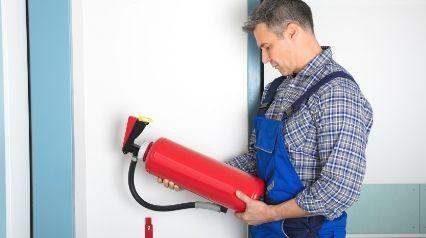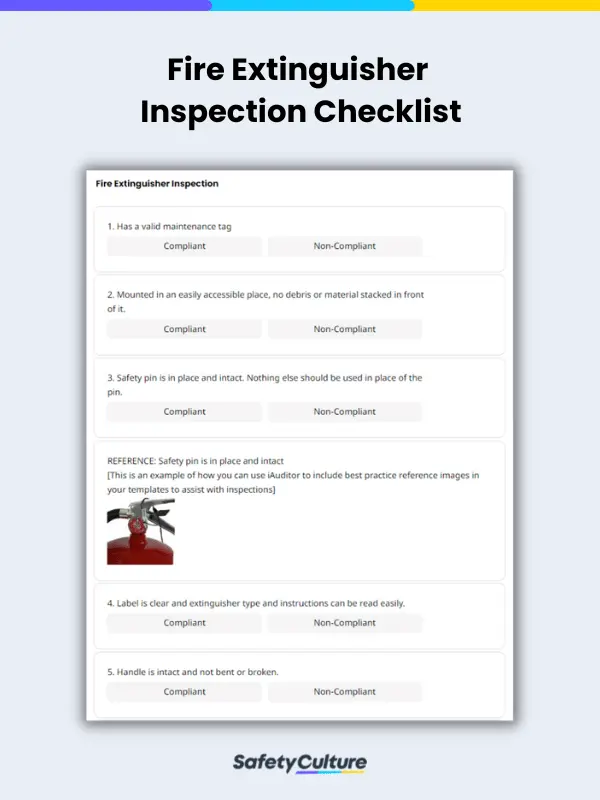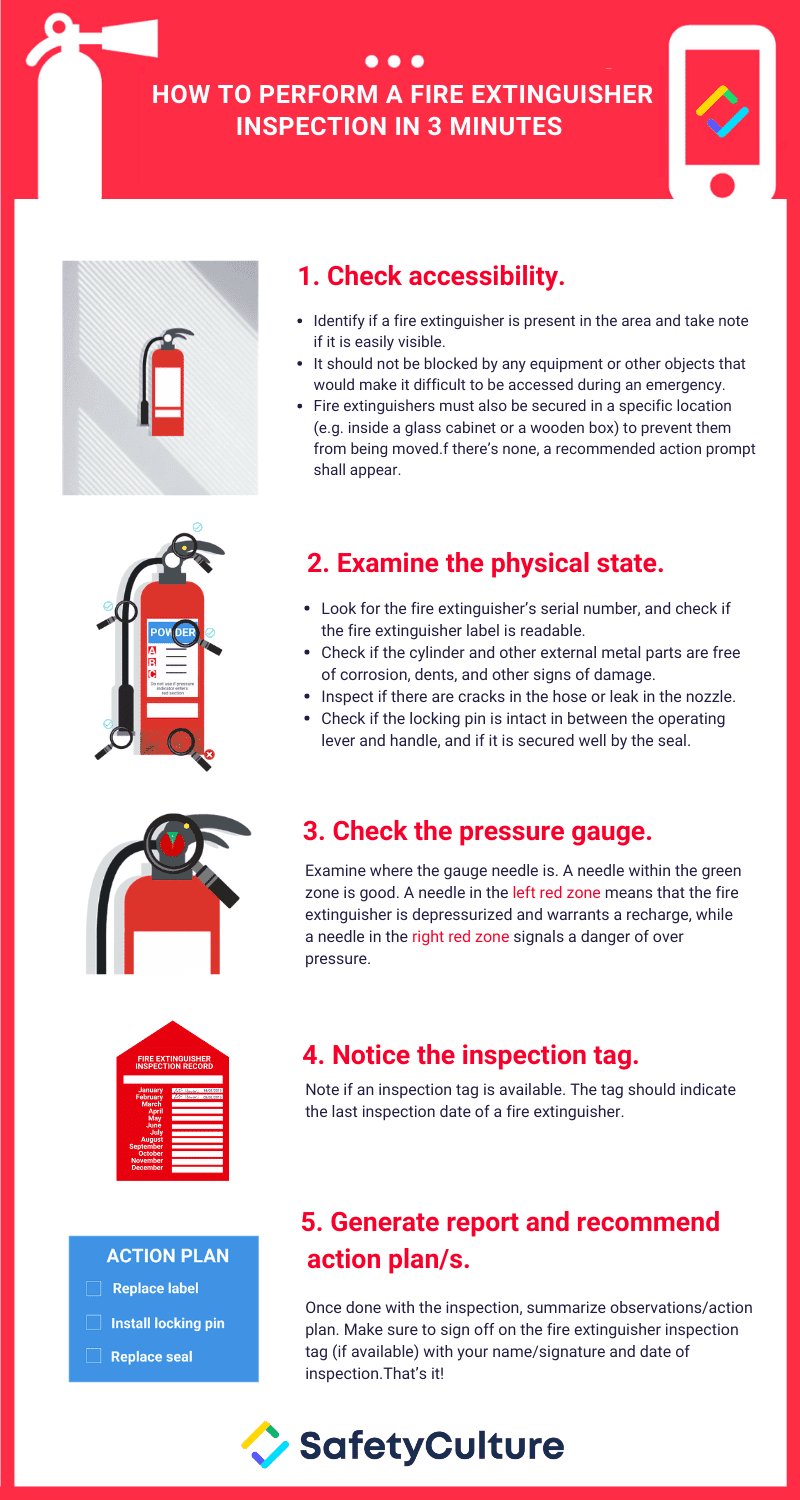What is a Fire Extinguisher Checklist?
A fire extinguisher checklist is a tool used by safety officers and facility managers when conducting scheduled fire extinguisher inspections. Also called a fire extinguisher inspection form, it allows inspectors to record details about the fire extinguishers such as label and maintenance tags. Other observations could be documented as well such as the exact location and its current condition. Employers are required to provide fire extinguishers in the workplace and have it inspected every month. This lowers risks, prevents any issues, and injuries in the event that a fire extinguisher is needed. Follow all steps in the checklist for a thorough inspection and proper documentation.
Why Use a Fire Extinguisher Checklist?
These checklists enable inspectors to proactively identify any issues that could compromise the effectiveness of fire extinguishers during emergencies. Employers must adhere to legal requirements that mandate monthly visual inspections of portable fire extinguishers. Non-compliance with these regulations not only exposes businesses to penalties but may also jeopardize the safety of employees and the workplace in the event of a fire incident.
To meet the obligations for annual or monthly fire extinguisher inspections, individuals have the option to employ a fire extinguisher self-inspection checklist or a comprehensive fire self-inspection checklist that encompasses an evaluation of fire extinguishers. These self-inspection checklists, such as the Gates Fire District Self-Inspection Form Checklist, cover various aspects, including the following:
- Condition of grounds
- Interior doors
- Stairways
- Heating and air conditioning equipment
- Electrical equipment,
- Control panels
- Housekeeping
- Fire protection measures
By utilizing these checklists, businesses and individuals can proactively contribute to a safer work environment and ensure compliance with fire safety regulations.
What Should be Done During Monthly Fire Extinguisher Inspections?
The following parts are checked and tasks are completed during monthly fire extinguisher inspections. These are done not only for compliance with the law but also because employers need to ensure that the extinguishers are going to work in case of a fire.
- Make sure that the maintenance tag is valid.
- The fire extinguisher is mounted in an easily accessible place with no debris or material stacked in front of it.
- Safety pin is in place and intact. Nothing else should be used in place of the pin.
- Label, extinguisher type, and instructions should be easy to read.
- Extinguisher handle is intact and not bent or broken.
- Pressure gauge is in the green and is not damaged or showing “recharge.”
- The discharge hoses/nozzle is in good shape and not clogged, cracked, or broken.
- Make sure it is full by turning it upside down at least three times.
- Location of extinguisher is easily identifiable by signs.
- Dust and wipe down the extinguisher.
- Indicate the overall condition of the extinguisher if pass or fail.
- Sign and enter the date of the monthly inspection on the annual maintenance tag.
These 12 steps are found in this fire extinguisher checklist format that can be downloaded for free.
What Should be Recorded on a Fire Extinguisher Inspection Checklist?
Fire extinguisher inspection checklists help inspectors conduct and record their monthly and yearly checks with due diligence, preventing them from missing crucial points in checking if fire extinguishers are in good working condition. Here are what a checklist typically contains based on a monthly fire extinguisher inspection form:
Information about the fire extinguisher
Inspectors need to know and record the exact location of the extinguisher as well as the following—serial number, manufacture and expiry date, type, size, and rating of the fire extinguisher.
Details of the visual inspection
Does the extinguisher have a valid maintenance tag that is signed and dated? Is the extinguisher accessible and its safety pin is intact with the handle not bent or broken? Other information to note are—label should be clear, pressure gauge as at green, hoses in good condition, and if the extinguisher is full.
Confirmation of inspection
The inspector should sign and include the date on the fire extinguisher inspection checklist to confirm the completion of the inspection. Also, if applicable, sign the inspection tag of the fire extinguisher.
How to Conduct Regular Fire Extinguisher Inspections Efficiently?
Crucial in maintaining the safety of the workplace and complying with regulations, regular fire extinguisher inspections need not be too tedious or time-consuming. Follow these 5 key steps in inspecting fire extinguishers and conduct your checks with efficiency.
1. Check the accessibility
Do a visual check and assess the visibility and accessibility of the fire extinguisher:
- Fire extinguishers should not be blocked by other objects so that they’re easy to see and access in case of an emergency.
- Secure portable fire extinguishers in a specific location to prevent them from being relocated when not in use.
2. Check the physical state of the fire extinguisher
Pick up the fire extinguisher and check for physical defects or anything that your checklists instructs to look for such as:
- The cylinder’s external metal parts should have no signs of damage or corrosion.
- The connection between the cylinder and the hose should be secure.
- The locking pin is secure and goes through the holes of the discharge lever and handle.
3. Check the pressure gauge
The needle of the pressure gauge should be within the green zone. A needle in the left red zone means the fire extinguisher is undercharged while a needle in the right red zone means the cylinder is overcharged. Take care when handling pressure vessels such as fire extinguishers.
4. Check the inspection tag
The inspection tag should be available and shows the signature and date/s when the fire extinguisher is inspected.
5. Corrective action taken for issues found should be included in the inspection report
Summarize observations, record corrective actions, and sign the fire extinguisher inspection tag (if available) with your name/signature and date of inspection.
Want to learn more about fire extinguisher inspections such as the most common issues identified? Click here. We also prepared a PDF guide to show you what a completed monthly fire extinguisher inspection looks like.
FAQs about Fire Extinguisher Inspection Checklists
When conducting the monthly inspection checks, account for the following items and make sure that they are functioning as they should be:
- Location and accessibility
- Manufacture and expiry date
- Maintenance tag
- Safety pin
- Label
- Handle
- Pressure gauge
- Discharge hose/nozzle
Fire extinguishers should be inspected when they are initially installed, and once every month after that. This is according to the National Fire Protection Association (NFPA).
Depending on the severity of the issue found, inspectors have the option to either repair the broken part, remove obstructions if there are, or replace the fire extinguisher altogether if it’s too damaged.




